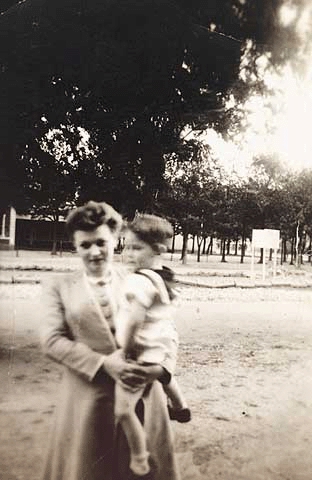Territorial Rights (22 page)
Read Territorial Rights Online
Authors: Muriel Spark

‘You’re mistaken if you think wrong-doers are always unhappy,’ Grace said. The really professional evil-doers love it. They’re as happy as larks in the sky. I wasn’t a Matron all those years without finding out a thing or two about human nature.’
‘Oh, Grace, all I want to say is I’m thankful Robert’s not in bad company and unhappy. It’s the most lovely present I ever had. I don’t know how much—’
‘The unhappy ones are only the guilty amateurs and the neurotics,’ said Grace. The pros are in their element.’ The telephone buzzed and crackled.
‘I don’t hear what you’re saying, Grace. It’s difficult on the phone. I hope to see Robert again soon. He doesn’t say, but—’
‘You’ll be seeing Arnold soon,’ Grace said.
‘What’s happened to the student girl? I’ve been thinking it over. Was she the same foreign girl that Robert took up with?’
‘That’s right. You’re a good guesser, Anthea. It was a very paternal relationship, Anthea. The girl well, I say “girl” but she’s no spring chicken is going back to her own country. It’s behind the Iron Curtain but her boy-friend’s a party boss so he can make it all right for her. In fact she told me they’ll welcome her with open arms.’
Anthea seemed to gather that a party boss meant a master of ceremonies at a dance, but she was not much interested in this foreign girl, and the line continued to crackle. She started to give Grace a better description of the diamond and sapphire bracelet until Grace interrupted, saying she was going to an evening mass, for the experience and the atmosphere, with Leo, who always translated the sermons for her.
‘But Grace, don’t tell Arnold about the bracelet. I want it to be a surprise,’ Anthea shouted.
That’s right. And the last time I went to a service here in Venice there was a sermon about birth control that Leo translated for me under his breath. I don’t know why the RC church doesn’t stick to politics and keep its nose out of morals.’
‘I’ll let you see it when you come home, Grace. It’s the most lovely bracelet.’
‘Yes, a lovely holiday. Venice is fantastic, lovely.’
In bed, in her dreams, came Anthea’s Ayrshire grandmother with her song:
There’s a youth in this city, it were a great pity,
That he from our lasses should wander awa;
For he’s bonie and braw. …
Weel-featur’d, weel-tocher’d, weel-mounted and braw;
But chiefly the siller, that gars him gang till her,
The pennies the jewel that beautifies a’.
… the pennie’s the jewel …
… the jewel. …
R
OBERT AND
A
NNA WERE
having a drink in a bar in Trieste, smiling at each other. A middle-aged man in a business suit approached them.
‘What do you want?’ Robert said.
‘I’m a talent-spotter. You two have got everything. You’ve got style. You can make the top.’
As a result of this meeting Robert and Anna were sent to the Middle East to train in a terrorist camp.
Lina returned to Bulgaria with Serge where she was put to happy use as a first-rate example of a repentant dissident, the moment, besides, being right. News of her re-defection was loudly proclaimed in the western papers and she was encouraged to give interviews to the journalists of all nations on the theme of western decadence and all the vicissitudes of her life in Paris and Venice. She described her tumble-down flat. She described the slave-driving Countess who forbade her to eat meat and gave her no time to do her paintings. She bewailed her father’s grave, which she had never found. She told of the elderly American millionaire who went about with a briefcase full of dollars seducing young people of both sexes.
Curran saw that his briefcase got into the hands it was destined for; then he went to India to see his guru.
Violet persuaded Leo to take over the fine studio at the top of her house and to join her in launching a tourist project called ‘Venice by Night’. Leo became an excellent travel executive and did well for himself and Violet.
Arnold, on his return to Birmingham, was greatly relieved to find Anthea in a good humour, indeed in a state of excitement. She showed him Robert’s diamond and sapphire bracelet.
‘You always thought he had no heart,’ she said.
‘Oh, I wouldn’t say that. He was always kind to animals, don’t forget.’
Grace Gregory and Mary Tiller went on a round-the-world tour together in search of adventures which made Mary feel agreeably guilty and Grace happily conscious of the comparative innocence of her own past life.
Katerina and Eufemia were always busy in the Pensione Sofia, whether attending to their guests at all seasons of the year or cultivating their roses in the garden, beyond which the canals lapped on the sides of the banks, the palaces of Venice rode in great state and the mosaics stood with the same patience that had gone into their formation, piece by small piece.
Dame Muriel Spark (1918–2006) was an acclaimed Scottish novelist, short story writer, and poet whose rhythmic prose and penchant for dark comedy made her one of the twentieth century’s most distinctive writers.
Spark was born Muriel Sarah Camberg on February 1, 1918, in Edinburgh, Scotland. Her engineer father, Bernard, was Scottish, while her mother, Sarah Elizabeth Maud, was English family. Their mixed-faith background would fuel many of the moral concerns of Spark’s later novels. Spark was raised in Edinburgh and from an early age attended James Gillespie’s High School. There her education was closely guided by an idiosyncratic teacher named Christina Kay, the inspiration for the title character in her best-known novel,
The Prime of Miss Jean Brodie.
After school, Spark worked as a department store secretary, taught English, and took college courses before meeting Sydney Oswald Spark, whom she married in 1937. Sydney Spark had a teaching job in Rhodesia (now Zimbabwe), and Spark followed him there to get married in 1937. In 1938 she gave birth to a son, Robin. However, Sydney suffered from mental illness and was physically and verbally abusive. Spark left her husband, taking her son and his nanny with her in 1940, but because of World War II’s travel restrictions, she was unable to return to Britain until 1944.
Once arrived, she settled in London, where she worked for the Foreign Office; after the war, she took on a series of writing and editing jobs, mostly for literary and trade magazines. She was the editor of
Poetry Review
for a few contentious years, until her insistence on searching out unknown poets and paying them for their work caused discord. It was while editing a collection of letters by Cardinal Newman that Spark began to explore Catholicism, eventually joining the Roman Catholic Church in 1954.
After nearly collapsing under the pressures of poverty, loneliness, and an addiction to Dexedrine, Spark sought help for her drug use and began to work seriously on a first novel,
The Comforters
(1957), partly with the financial and emotional support of the novelist Graham Greene. Though a late fiction writer, Spark began producing novels and stories at a rapid pace. In 1961 she wrote
The Prime of Miss Jean Brodie
, widely considered her masterpiece. The novel follows a teacher at a girls’ school who carefully and manipulatively cultivates the minds and morals of a select handful of promising pupils. In 1969, it was adapted into an Academy Award–winning film starring Maggie Smith and was a Royal Command Performance.
Many of Spark’s novels were brisk, black comedies with vivid characters and subtle moral underpinnings, partly influenced by Spark’s interest in religion.
The Mandelbaum Gate
(1965), for instance, is set in Jerusalem during the Adolph Eichmann trials, which she covered for the observer newspaper.
The Only Problem
(1984) draws from the Book of Job, while
The Takeover
(1976) skewers shallow religious conviction. Aside from questions of faith, novels such as
Territorial Rights
(1979) and
Reality and Dreams
(1996) center on protagonists that search for a moral center.
Spark lived for a time in New York City, where she was given an office at the
New Yorker
. The city was the setting for her novel
The Hothouse by the East River
(1973). She lived in Rome for many years writing short and more experimental novels until she moved to Tuscany, where she would live for the final thirty years of her life with her assistant and friend, the painter and sculptor Penelope Jardine. Spark regularly published throughout these decades, garnering many honorary degrees and was made a Dame of the British Empire in 1993, a Commandeur des Artes et des Lettres in 1996, and an Honorary Member of the American Academy and Institute of Arts and Letters in 1978. She died in Tuscany in 2006.
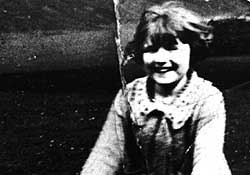
Spark as a child. She began attending James Gillespie's High School for Girls at the age of five.
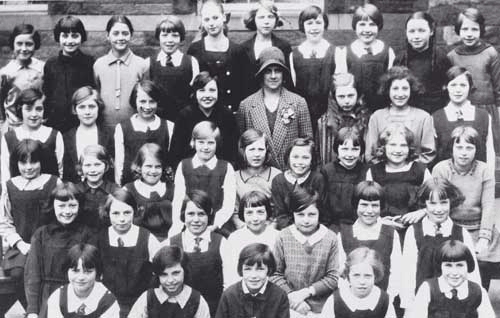
A 1930 school photograph of the junior class of James Gillespie’s High School for Girls. Spark is seated in the middle row, second from the right. Also pictured, in the middle, is the teacher who was the inspiration for Spark’s Miss Jean Brodie, Miss Christina Kay.
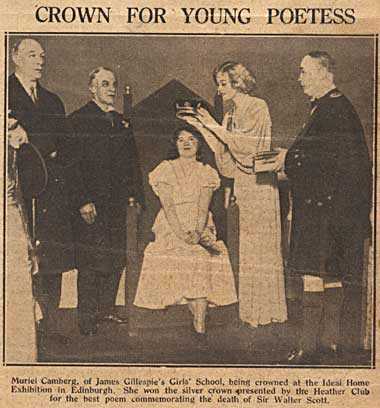
A 1932 newspaper clipping of Spark being crowned the “Queen of Poetry” for winning first prize in a poetry competition. She was crowned by Esther Ralston, a popular silent film actress of the day.
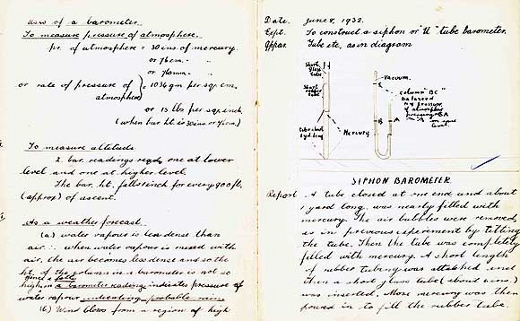
Pages from Spark’s notebook from her science class in 1932. Her sketch of a siphon barometer is prominently featured.
